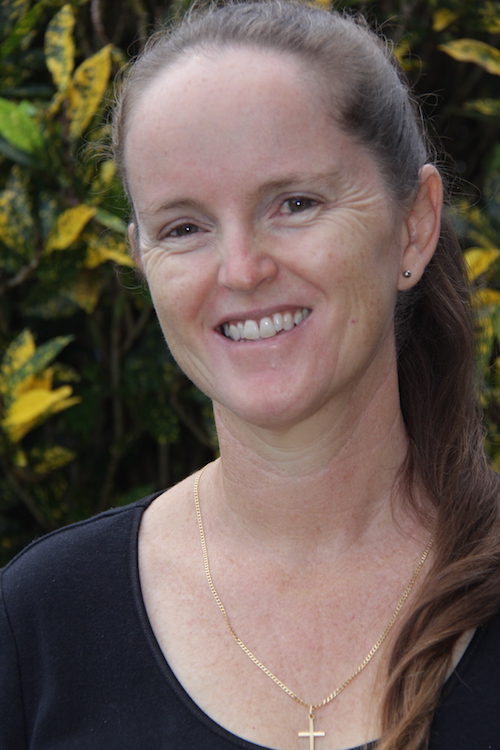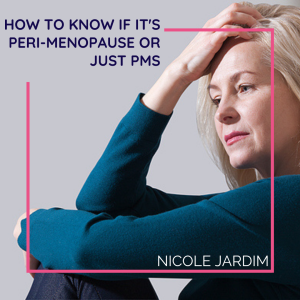A brand new, awesome guest post by one of my Fall 2015 apprentices Rikki Bradley. She breaks down how to tell the difference between PMS symptoms and Peri-menopause. Take a read!
I used to consider Premenstrual Syndrome (PMS) and Peri-menopause to be very different, so, if you thought the same, it may surprise you to realie how close the symptoms of these two really are.
I once believed PMS was for the young, and peri-menopause was when you were heading out of the fertile years and entering into the wisdom of menopause. But again I was wrong.
As it is now evident that not only can you have either PMS OR Peri-menopause, but it is becoming more common that you could actually be experiencing both! At the same time! Sadly age is not a good indicator; no longer just arriving in your later years, younger women are now experiencing the effects of menopause earlier due to hormonal contraceptives, hormonal imbalances and lifestyle choices.
PREMENSTRUAL SYNDROME – PMS
It is estimated that around 75% of menstruating females experience some form of PMS, with 30-40% suffering to the level that their daily activities are affected. The range of symptoms reported are so wide and varied that there could be in the vicinity of over 150 different symptoms that express themselves both physically and emotionally each and every month.
For some, the effects are life altering and the band aid solutions of oral contraceptives, pain relief medication and hot water bottles are not enough to unearth the root cause of what is considered one of the most common forms of hormonal imbalance affecting women today.
PMS can affect any menstruating female, any time from their first period on. Although PMS most often appears in adulthood, I was one who did experience symptoms of PMS right from day one, throughout my teen years and throughout adulthood. Even today, PMS remains a misunderstood and mistreated condition where symptoms are treated rather than addressing the underlying hormonal imbalance.
If PMS first occurs in your 40’s, it’s usually an early signal that you are entering peri-menopause.
PMS SYMPTOMS:
As mentioned, the symptoms of PMS are quite similar to those of peri-menopause: bloating, irritability, mood swings, lethargy, food cravings, headaches, and much more. One of the most common symptoms is dysmenorrhea, or menstrual cramping. For some women there is a tendency for their PMS to worsen over time. Fortunately, these symptoms all have their root cause in hormonal imbalances and women can address these through proper guidance and sustainable steps.
PERI-MENOPAUSE
This is the time preluding Menopause. Women are believed to enter this period of preparation some ten years before they actually cross over into menopause. For many women, heading into menopause is viewed with dread and this is mainly due to all the negative effects that we commonly hear.
But did you know that for women who experience PMS earlier in life and/or have unresolved PMS issues, this can actually determine how you transition into menopause and make peri-menopause extremely difficult.
For me this was very confronting. Years ago whilst I was studying Aromatherapy and dabbling in Ayurveda, I was surprised to find that women in traditional India not only had no word for menopause, but that the transition was uneventful. This is something we can all strive towards. But here’s the thing, as your body transitions into peri-menopause, you can still be having PMS. This is like a double whammy and not a joyful place for anyone to reside.
As we age it is natural for our periods to change. Although it is recommended to see your doctor if you are getting your period more than once a month to rule out any serious conditions, once you are over 40 if your period arrives spasmodically at 40, 30, 50 days or any combination of variation, it’s time to high-five peri-menopause.
Gone is your regularity, if you were blessed with regular periods, and the gap will eventually surpass 12 months when you are officially considered to be through peri-menopause and have joined the elite Menopause club.
PROGESTERONE IN PERI-MENOPAUSE
The lovely, calming, soothing hormone progesterone is the first hormone to drop in peri-menopausal women. In a woman’s fertile years progesterone is produced around ovulation to maintain regular periods, allow conception and nurture a growing baby. As women approach peri-menopause ovulation starts to become not so regular and progesterone checks out. As a result of losing this calming hormone, many women experience anxiety.
HOW TO KNOW IF YOU’RE EXPERIENCING PMS OR PERI-MENOPAUSE
Generally speaking, if your periods are occurring regularly, it’s PMS. If your periods are variable, it’s peri-menopause.
But here’s the thing, regardless of your stage of life if you are experiencing PMS and/or symptomatic peri-menopause, now is the perfect time to turn the symptoms around and enjoy a happier, more joy filled life.
Don’t let hormonal imbalance dictate the quality of the life you lead. Life was made to be lived, and that is exactly what you deserve. For 20 years I experienced the physical and emotional effects of PMS that have robbed me of valuable life. But to now know how to work and live with my cycle and hormones, and embrace them, life looks so much better.
With the right guidance, lifestyle changes, stress management and self-care you too can enjoy the freedom of your body, whether you are cycling, transitioning or living in menopause. The female body is amazingly intricate and you deserve to thrive in it and live the life you dream.
For more on the stats in this post: click here.
 Rikki is a Women’s Health Coach following her passion to see women of all ages living their best life through understanding their body, their hormones and the lifestyle they wish to create. Everyone deserves to experience energy, vitality and good solid health and know how to achieve it on a personal level as we are all created individually and there is no one size fits all solution. Her background includes life as a Registered Nurse, Massage Therapist with several different modalities and an Aromatherapist. Putting all of this together, mixed with life experience she offers a holistic approach to your life, body and your glorious hormones who, as we know run the show. She currently sees clients in person or via skype from the beautiful tropical Far North Queensland location of Cairns, Australia. She loves seeing women regain their lost energy and learn to listen to their body so they can really be living each day.She is also launching her first group program next month! Learn more at www.rikkibradley.com.au.
Rikki is a Women’s Health Coach following her passion to see women of all ages living their best life through understanding their body, their hormones and the lifestyle they wish to create. Everyone deserves to experience energy, vitality and good solid health and know how to achieve it on a personal level as we are all created individually and there is no one size fits all solution. Her background includes life as a Registered Nurse, Massage Therapist with several different modalities and an Aromatherapist. Putting all of this together, mixed with life experience she offers a holistic approach to your life, body and your glorious hormones who, as we know run the show. She currently sees clients in person or via skype from the beautiful tropical Far North Queensland location of Cairns, Australia. She loves seeing women regain their lost energy and learn to listen to their body so they can really be living each day.She is also launching her first group program next month! Learn more at www.rikkibradley.com.au.



